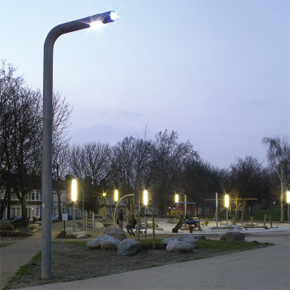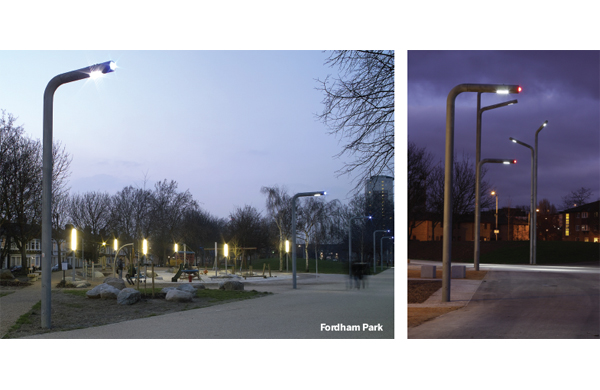
Smart investments in lighting infrastructure for a brighter future
We live in an uncertain time. The huge financial pressures central Government is facing around spending decisions is filtering down to local councils across the UK. Local authorities have been cost cutting where possible, with a number of councils resorting to turning off street lighting at night to save on electricity bills.
While this may seem like a quick and easy money-saving solution, night-time blackouts have repercussions on residents’ safety and quality of life, and are not sustainable cost-saving solutions. There are smart investments to be made in lighting infrastructure that can save public sector money without cutting frontline services.
Nick Farraway, vice president and general manager for Cree Lighting EMEA discusses in this month’s issue of PSB Magazine…
Energy-efficient lighting
With the recent advances in LED technology, investing in quality urban lighting guarantees significant energy savings as well as safe neighbourhoods for the long-term. High-quality LEDs require up to 70% less energy than traditional street lanterns, making them much less costly to run.
Moreover, they have longer lifetimes and high reliability which also significantly reduce maintenance costs.
Local government needs to understand the cost of operating current systems to really see the value of changing to energy efficient lighting systems.
A number of UK councils have already made the switch to LED lighting to reap the long-term cost benefits. As part of the London Borough of Hackney’s plan to improve Shoreditch Park in 2009 for instance, the council installed 54 LED luminaires to illuminate the park’s pathways at night.
It is estimated that over the next twenty years, these luminaries will save the council £66,000 in maintenance costs alone, while making the park a safer place after dark.
A good public lighting system will deliver further efficiency through the adequate use of its lighting controls, which allow users to automatically switch lights on and off, and control brightness levels to suit the urban environment.
These controls enable councils to create a specific lighting effect and meet regional requirements around light pollution, while cutting back on inflated energy bills.
The savings generated from the switch to LED lighting can be used to repay the investment and support local community projects.
A green investment
However, the benefits of LED lighting technology is not just limited to cost-cutting. It also plays an important role in ensuring local authorities meet their sustainability energy targets.
For example, the LED lighting installation in Shoreditch Park is expected to drastically reduce local CO2 emissions. By 2025, the Borough of Hackney will have saved the equivalent of 8,000 trees, simply by using energy efficient lighting in one of its parks.
LEDs themselves are a sustainable investment as the LED control systems are based on software that can be updated as technology advances, ensuring the product is future ready.
The importance of bespoke quality
The halo effect of LED technology is becoming increasingly evident as more and more councils around the country adopt the technology.
As LED technology advances and prices become more competitive, public sector executives recognise that there is a clear business case to be made for investing in LED lighting.
That said, a number of councils have rushed to adopt cheaper LED lighting systems with poor glare control, which can present a security hazard or even disturb residents living nearby.
In order to make the switch to LED lighting seamless, sustainable and comfortable for all, it is important to opt for a system with high-quality optical control that prevents spill-light and directs the light only where it is needed.
Over the next five years, we expect to see a rise in demand for specific and high-quality lighting solutions that combine LED performance with sophisticated designs in towns and cities across the UK.
In 2011, the Landscape Partnership responsible for Fordham Park in the London Borough of Lewisham, commissioned a truly unique lighting project that brought together advanced LED technology with a bespoke design that evokes the playfulness of the park.
The park’s pathways are now lit with LED fixtures, built into custom-made metal lamp posts which were designed based on the industrial ventilation pipes on the buildings visible from the park.
As well as illuminating the space, these lamps also cast intense spots of light on the points of intersection of the footpaths, creating a better sense of space. Decorative red, blue and green LED markers also line the park pathways to remind visitors of the fun atmosphere of the park, even after nightfall.
This project is a prime example of how quality LED lighting can bring an area to life after dark, transforming it into a beautiful and truly welcoming space for residents with a clear and distinctive white light.
A brighter future
More and more, we are seeing LED technology paired with communication technologies, sensors and data mining programmes to really turn public lighting into a multi-purpose service for the community.
In the near future, we expect more towns and cities across the UK to make use of intelligent lighting systems that use noise or motion sensors to increase or decrease illumination, as well as sensors that monitor traffic flow and are able to turn on CCTV cameras, or alert community safety responses in the case of an emergency.
Lighting networks are increasingly becoming genuine data transmission networks, offering councils greater flexibility and cost-saving benefits, and it is only a matter of time until smart lighting takes centre stage in the public sector in the UK.
Latest news

29th April 2025
Senior pledges to ‘bee’ part of the solution with new biodiversity initiative
Senior Architectural Systems has installed its first on-site beehive, marking another step forward in its commitment to sustainability and biodiversity.
Posted in Articles, Building Industry News, Building Products & Structures, Building Services, Curtain Walling, Doors, Glass, Glazing, Innovations & New Products, news, Restoration & Refurbishment, Retrofit & Renovation, Sustainability & Energy Efficiency, Walls, Windows
29th April 2025
West Fraser range delivering key benefits for South-East carpentry company
An experienced carpenter and building site manager who has recently set up his own company is using high performance panel products from the West Fraser range.
Posted in Articles, Building Industry News, Building Products & Structures, Building Systems, Case Studies, Garden, Restoration & Refurbishment, Retrofit & Renovation, Sustainability & Energy Efficiency, Timber Buildings and Timber Products
29th April 2025
CPD Courses Available Online From Ecological Building Systems
Ecological Building Systems, a leading supplier of natural building products for sustainable construction, has revealed its comprehensive CPD programme for the year ahead.
Posted in Articles, Building Industry Events, Building Industry News, Building Products & Structures, Building Services, Continuing Professional Development (CPD's), Information Technology, Innovations & New Products, Insulation, Restoration & Refurbishment, Retrofit & Renovation, Seminars, Sustainability & Energy Efficiency, Training, Walls, Waste Management & Recycling
29th April 2025
WindowBASE launches new prospect databases at FIT Show
Visit WindowBASE at the FIT Show to see first-hand how it helps companies find new customers – the company is launching an easy-to-use, intuitive platform on Stand G16 at the NEC Birmingham from 29th April – 1st May.
Posted in Articles, Building Industry Events, Building Industry News, Building Products & Structures, Building Services, Doors, Exhibitions and Conferences, Glass, Glazing, Information Technology, Innovations & New Products, Posts, Publications, Research & Materials Testing, Restoration & Refurbishment, Retrofit & Renovation, Windows
 Sign up:
Sign up: 
